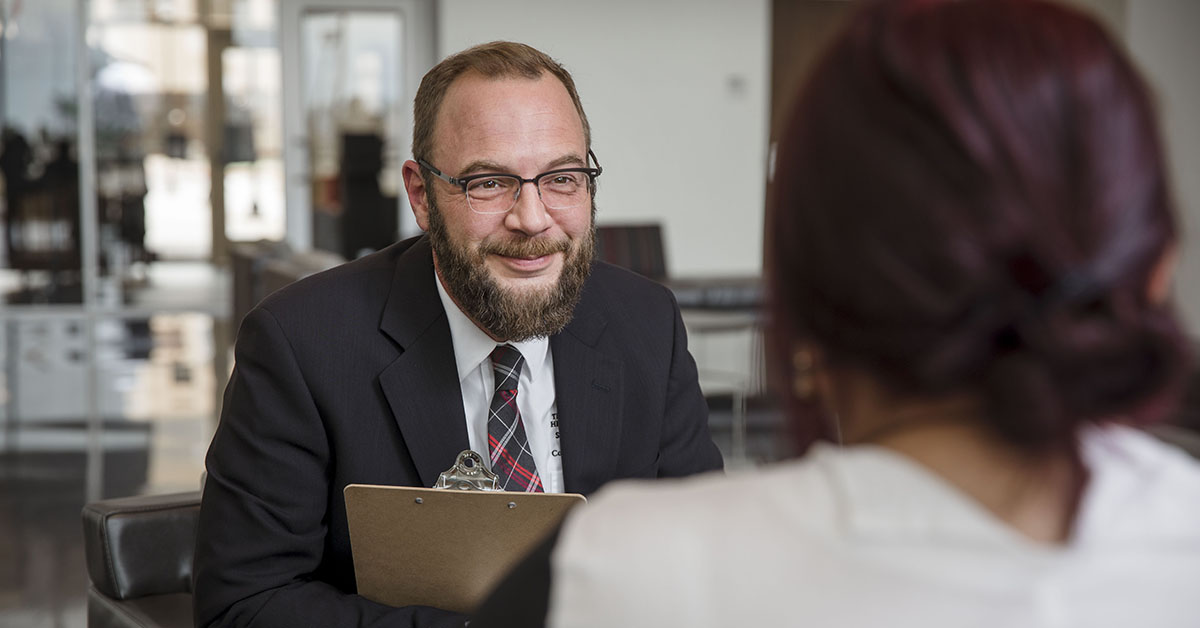Taking a Look at Addiction and Recovery
Addiction is a neurological brain-based disease that changes the brain

September is National Recovery Month. The Substance Abuse and Mental Health Services Administration (SAMHSA) describes it as a “national observance held every September to promote and support new evidence-based treatment and recovery practices, the emergence of a strong and proud recovery community, and the dedication of service providers and community members across the nation who make recovery in all its forms possible.”
We spoke with Zachery Sneed, PhD, on what research is teaching us about addiction, the different options patients have in finding recovery, and misconceptions that persist about both. Sneed is an Assistant Professor and Director of the Master of Science in Addiction Counseling program in the TTUHSC School of Health Professions and was named “Outstanding Teacher of the Year” in 2021 by the TTUHSC Student Senate.
Misconceptions of Addiction and Recovery
“We’re still dealing with an old misconception that addiction is about making a choice, that it’s just free will,” Sneed begins. It’s easy to think that an individual should be able to simply stop an unhealthy habit or unwanted behavior, and stay stopped. However, Sneed explains that the science tells us it is a neurological brain-based disease that changes the brain as a result.
“That has ramifications in terms of learning and expressing emotions,” he says.
Another misconception is that once a person has quit their substance or behavior, it should be easy to “stay quit.” While the brain adapts and changes with abstinence, it does take time.
“Thirty days (of sobriety or abstinence) are difficult. Ninety days are difficult, but it can be done,” Sneed says. “Depending on the substance and when it was started, we could be looking at predictable recovery patterns of up to seven years.”
It is important that we understand the base cause of addiction and how time is involved.
Sneed implements a revealing exercise when speaking to classes or groups about addiction. He proposes different examples and scenarios that are seemingly related to addiction and many respondents come back with moralistic judgements. But it turns out that he’s talking about a patient with diabetes or heart disease.
“[Addiction] is a health condition that requires behavioral and environmental changes,” he explains. “You don’t just stop being diabetic because you want to.”
Improvements in physical and health takes time and commitment and sadly many don’t give that grace to substance use disorders, instead viewing in binary “good or bad” terms as a vice.
More Options Than 12 Steps

Most of us know about the various 12 step recovery programs such as Alcoholics Anonymous,
Narcotics Anonymous, etc. The 12 step model has worked for many for a long time, but
it is not the only path to recovery.
“There are a variety of options available to people who want to engage in recovery,”
Sneed says. “Experts have discussed since the beginning that there’s not necessarily
one path for everybody.”
While a 12 step program makes a lot of sense to a lot of people, there are some for whom it won’t work, whether it’s a spiritual disagreement or anything else. Sneed explains that alternative recovery programs have been developed since the 1970s.
“It depends on where you live and what resources are available,” he says. A wonderful aspect of the internet is that it’s brought recovery resources to people across any distance. There are meetings online for many recovery programs, such as SMART Recovery.
Some recovery programs include addressing your spiritual life and other focuses on giving people abilities to detect their urges and make changes before lapsing into use. Sneed stresses that one program isn’t better than another.
“You have to do what works for you,” he says. “It’s your life, your change, and your recovery. You should be in charge.” Now, more than ever, people can find a model of recovery that is right for them.
The Causes of Addiction
Sneed says that it’s hard to answer what precisely causes addiction. The general agreement is that it’s 50% genetics and 50% environment.
“People can be genetically disposed to getting a strong dopamine rush from a substance, for instance,” he says.
Measuring the impact of one’s environment is more challenging. “The majority of the population has access to alcohol and has tried it. The majority of the U.S. population has tried cannabis,” he explains. So pinpointing the precise role an environment plays in creating an addiction is difficult.
But there are some trends and statistics that do point to environmental factors.
“We can drill really far into what someone’s environment looks like,” Sneed explains. “In parts of cities where the socio economic status is depressed, we see higher rates of liquor stores, cannabis use, and tobacco advertising.”
Populations in those areas are targeted by businesses looking to sell their product.
Addiction and the Coronavirus
Not surprisingly, drug and alcohol use rates have increased over the past two years with the pandemic. Sneed reminds us that before the pandemic the country was in conversation about the opioid epidemic. He is quick to point out that the COVID pandemic and the opioid pandemic are occurring at the same time.
“People are staying home, isolated, experiencing anxiety, depression and extra stress,” he says. “One of the ways people tend to deal is through drinking, smoking, and turning to substance use as a way to cope.”
Sneed warns that the third wave of a pandemic is often mental health issues, suicides, and domestic violence situations. The fourth wave is behavioral health issues and we’re in the very beginning of this hard process. As communities begin to open back up, some will notice that the drinks they order in a bar seem weak. That’s because the drink is being poured by a professional who knows how much to pour. Many have been pouring more and more, larger and larger drinks at home with no peer supervision.
The Addiction Recovery System

We asked Dr. Sneed what challenges counselors and facilitators face systematically in providing recovery opportunities to patients. A positive change came with the passage of the Affordable Care Act. Before that legislation, individuals had to have the money to pay out of pocket for many recovery services. That made it harder for people to seek help.
“Now we’re seeing that change and more people than ever before are admitting they need help and relying on health insurance,” Sneed says.
He says there is still a need for more facilities, counselors, and people who specialize in addiction and recovery. The Masters in Addiction Counseling offered by TTUHSC is a special program, one of only 12 that offer a Masters level degree focused on addiction counseling.
“We work to train people better and as quickly as we can.”
The opioid epidemic has affected the stigma surrounding addiction as people have seen that addiction can truly happen to anyone.
“We’re talking about our moms, husbands, uncles, people who have developed opioid addictions from prescriptions that came from a physician,” he says. “The opioid epidemic shows this isn’t a character flaw or a moral failing.”
Sneed says there is a need for more peer led or peer self help services to exist in our communities as they are easier to develop and sustain.
An Amazing, Beautiful Experience
The message Sneed wants to champion is that treatment works and recovery is possible. “Addiction is about giving up everything for one thing,” he says. “Recovery is the opposite. It’s about giving up one thing for everything.”
“Recovery is an amazing, beautiful experience that has the ability to improve your life dramatically,” Sneed encourages. “It’s a chance for a person to get their life back to the way they want it. Let’s change the stigma. Let’s talk about it. Let’s treat it like it’s a health disorder with no shame.”
Related Stories
Celebrating Veterans: TTUHSC’s General Martin Clay’s Legacy of Service and Leadership
From his initial enlistment in the Army National Guard 36 years ago to his leadership in military and civilian health care management roles, Major General Martin Clay’s career has been shaped by adaptability, mission focus and service to others.
Texas Tech University Health Sciences Center School of Nursing Named Best Accelerated Bachelor of Science in Nursing Program in Texas
The TTUHSC School of Nursing Accelerated Bachelor of Science in Nursing (BSN) program has been ranked the No. 1 accelerated nursing program in Texas by RegisteredNursing.org.
TTUHSC Names New Regional Dean for the School of Nursing
Louise Rice, DNP, RN, has been named regional dean of the TTUHSC School of Nursing on the Amarillo campus.
Recent Stories
The John Wayne Cancer Foundation Surgical Oncology Fellowship Program at Texas Tech University Health Sciences Center Announced
TTUHSC is collaborating with the John Wayne Cancer Foundation and has established the Big Cure Endowment, which supports the university’s efforts to reduce cancer incidence and increase survivability of people in rural and underserved areas.
TTUHSC Receives $1 Million Gift from Amarillo National Bank to Expand and Enhance Pediatric Care in the Panhandle
TTUHSC School of Medicine leaders accepted a $1 million philanthropic gift from Amarillo National Bank on Tuesday (Feb. 10), marking a transformational investment in pediatric care for the Texas Panhandle.
Texas Tech University Health Sciences Center Permian Basin Announces Pediatric Residency Program Gift
TTUHSC Permian Basin, along with the Permian Strategic Partnership and the Scharbauer Foundation, Feb. 5 announced a gift that will fund a new pediatric residency.
